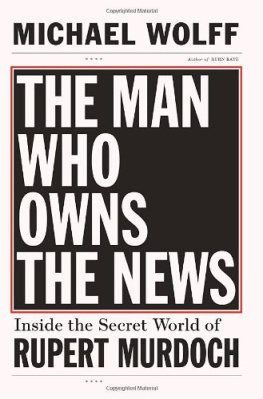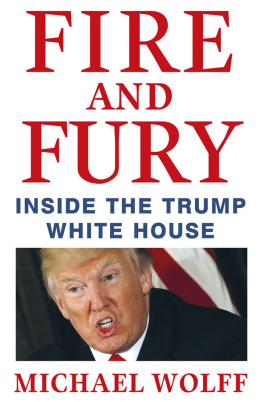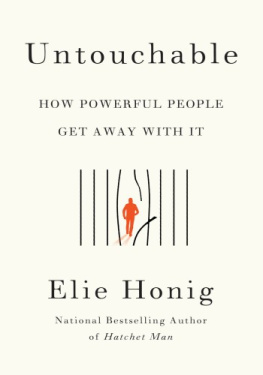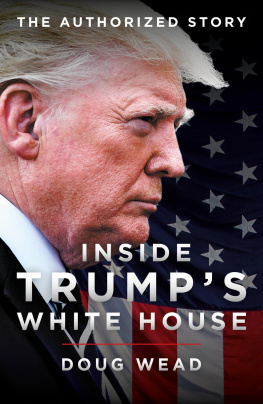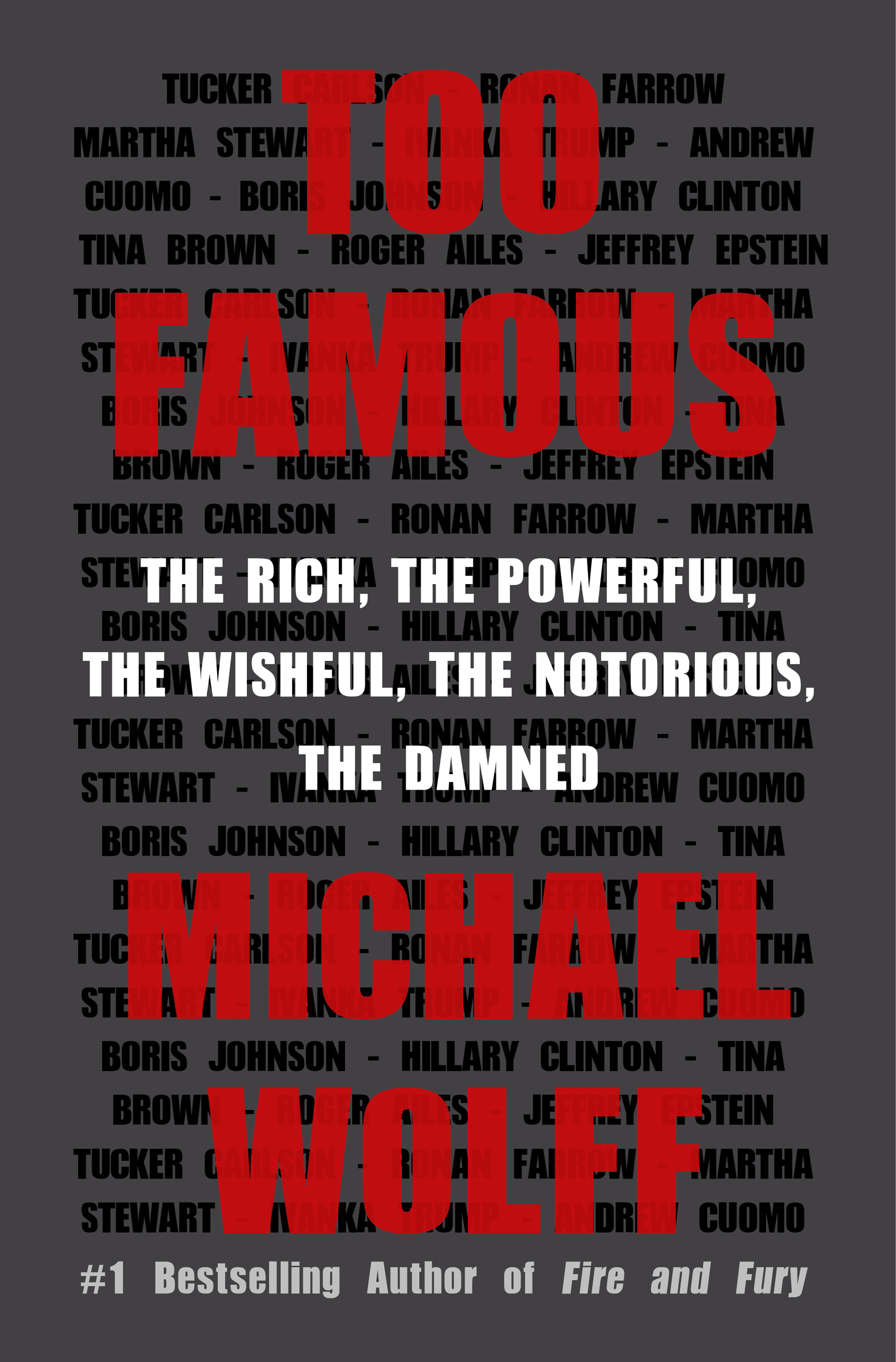Contents
Guide
Pagebreaks of the print version

The author and publisher have provided this e-book to you for your personal use only. You may not make this e-book publicly available in any way. Copyright infringement is against the law. If you believe the copy of this e-book you are reading infringes on the authors copyright, please notify the publisher at: us.macmillanusa.com/piracy.
For
Elizabeth, Susanna, Steven, Louise, and Jack
and
Sidney and Lillian
One night in the spring of 2016, with the presidential campaign heading in its loopy direction, Janice Min, the editor of the Hollywood Reporter, where I was writing a regular column, called excitedly to say that Id be able to interview Donald Trump if I could get from New York to Los Angeles, where he was doing a campaign stop, by midafternoon the next day. I confess to thinking that this was quite a lot of effort for a candidate who, while breathtaking in his novelty and ludicrousness, and confounding in his success to date, seemed to have no more of a chance of being president than I did.
But, for the sport of it, I went. That next evening, sitting with the candidate in his Beverly Hills home, filled with overstuffed furniture not unlikely cast off from one of his hotel lobbies, I looked Donald Trump in the eye and asked him the essential question: Why, exactly, are you doing this? He replied, with a clarity that few candidates have about their own motives and ambitions: To be the most famous man in the world.
I should have been more appalled. And yet it had an obvious logic. Most public people in my broad acquaintanceship with public people see notoriety and celebrity as key aspects of their identities. Whatever else they might have accomplishedwork they had done, organizations they had built, money they had madewas enhanced by, or depended on, or was meaningless without their public profile and renown. Trump was merely throwing pretense away and eliminating the need to perform for any reason other than attention itself. He had arrived at a place that other equally as craven but not as shameless fellow attention seekers could only dream about.
The road here is a tragic onefor the culture at large and, as well, for so many of the people who take it. But it is also the central thoroughfare: you cant understand public life without understanding the motivation for ever-increasing and eternal notoriety, and the mechanisms by which it is achieved, and, as well, the price you pay for it.
In 1998, New York magazine hired me to write its weekly media column. Writing about media had, theretofore, mostly involved the court politics at newspapers and network news divisions, journalism ethics and practices (media criticism), and sometimes a guilty fascination with the wealth and power of media CEOsthe moguls.
But, by the late nineties, several developments had pushed the media story into a new dimension: the trial of O. J. Simpson in 1995wherein the media gave up the pretense of its role as witness to the news and became the eager producer and stage manager of it; Bill Clinton and Monica Lewinsky in 1998, demolishing the line between public and private lives; and mass connectivity, which gave everybody a rooting interest in, and passionate opinion about, public actors, large and small.
News was personality. Personality was drama and entertainmentthat is, conflict. Notoriety, that is publicity, became the leading currency of our time. The needs, hubris, and ruthlessness of people at the apex of attention, celebrity, and influenceand those striving to reach itbecame the grease that kept the world spinning and news cycles rolling. The news was psychopathology. The media did not merely report on but created the people who made the news; likewise, self-promoters with ever-increasing skills and cunning gamed the media.
And then the world began to revolt against these modern monsters and the agents and enterprises who made them.
This new social and political force of personal aggrandizement and media power, the characters it has propelled, and the backlash it has inspired, while in many obvious ways deleterious for the commonweal, was propitious for me. As a journalist my interest wasnt so much subject-specific (e.g., politics, health care, prison reform, tech) as it was about how we live now. This vast, unquenchable thirst for attention among people I knewor was able to get to know precisely because they wanted public attention and I could help confer ithas been, to say the least, a compelling window through which to see the world.
Icarus anyone?
In the shadow of this celebrity culture, there slowly grew a finer understanding of how this need and quest for attention changed not only the people seeking it and the institutions and technology providing it, but the body politic itself: we expect a show, heroes, villains, life and death. And here, too, we began to understand, there was a new social and business system fostering all this ego and conflict, full of the scoundrels, swindlers, and self-promoters you might find in a Trollope novel.
If you are lucky as a writer, you get to match your interests, sympathies, hankerings, and fears with the culture of your time. I have had more than just a passing or arms-length relationship with many of the figures in this book. We were interested in the same thingor, more to the point, I was interested in them, hence they were interested in me. Everybody knew that most likely, if not explicitly, I would write about them, and yet persisted in talking to me. (Still, many would come to carry a grudge about the fact that I ultimately did write about the things they said to me.)
In my experience, the worst thing you can say about a social climberand almost everyone in this book is a determined social climberis that they are a social climber. It has always confused me why the obviousthe emperors nakednessis not obvious to all, and why we all cannot acknowledge the underlying comedy.
But pretense is the requirement of fame. And, perhaps not surprisingly, the more famous you become, the thinner your skin gets.
Almost everybody herein has been burned, often badly, by the fame they have soughtopprobrium, humiliation, prosecution, jail, even death. But few, other than the dead, have not continued to pursue it. Hillary Clinton has been shamed and maligned at a level impossible for mere mortals to appreciate and yet has consistently returned for more. Why? Because the famous and would-be famous see themselves as warriorsand implicit in the fight is the possibility of humiliation and defeat? Or because they are self-destructive? Or merely because fame is just the world they live inwhat else is there?
Several years ago, at one of the regular luncheons hosted by the British satirical magazine Private Eye, long dedicated to the pursuit of the overweening and famous (yet pleased to host lunch for them, too), I sat next to Jemima Khan, the socialite daughter of billionaire James Goldsmith, former wife of world-famous cricketer and present prime minister of Pakistan Imran Khan, and ex-girlfriend of Hugh Grant. She was convivially indiscreet about her relationship with Grantjust a boy from Chiswickand dropped a detail that I have cherished since. To the list of hurdles and impediments and limitations of life, Grant, according to Khan, added a new one: too famous. He had achieved not just fame, but way too much of it, such that it had the opposite effect and he had to be constantly vigilant about its blowback threats. Everything he did had to account for and be weighed against inevitable resentments, preconceptions, potential scandal, and social media schadenfreude, as well as constant selfies.


